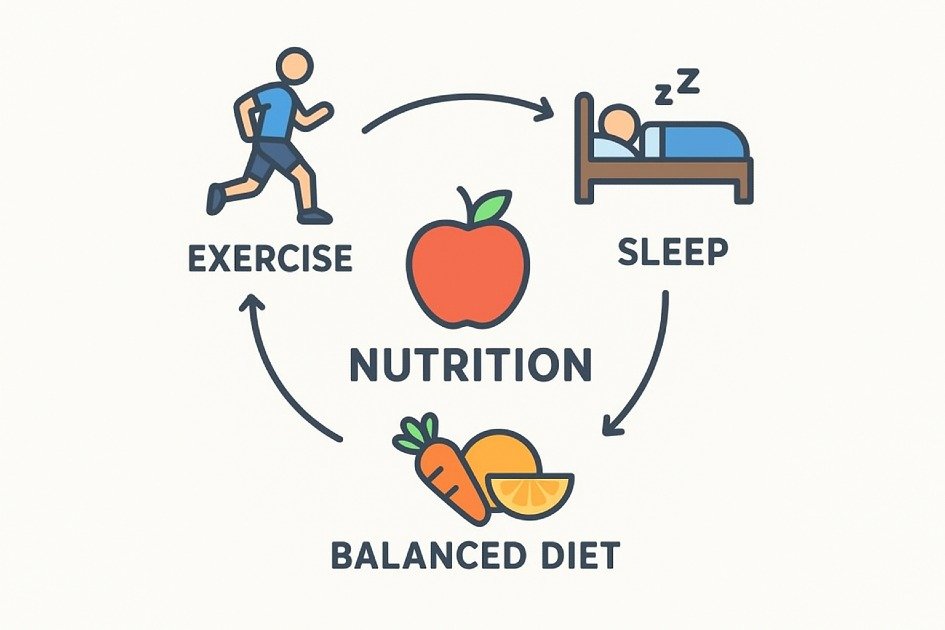Have you ever wondered why some people thrive on the same diet that leaves others drained. could lifestyle be the missing link? The secret to good nutrition is not only in what you eat but in how your daily habits and surroundings work with your food choices.
Lifestyle factors, including sleep quality, stress management, physical activity, social connections, and cultural environment, significantly impact nutrient absorption, metabolism, and overall wellbeing.
Harvard Health found that individuals who followed five lifestyle habits significantly reduced their risk of heart disease and cancer, and from age 50 onwards extended their life by over a decade.
Understanding these factors can unlock strategies for lifelong vitality, such as optimizing sleep patterns, managing stress, aligning work and social life with healthy eating habits, and respecting cultural traditions.
This guide emphasizes the importance of adjusting lifestyle factors to promote a more resilient, energized, and healthy life, emphasizing nutrition as a natural way to support body needs.
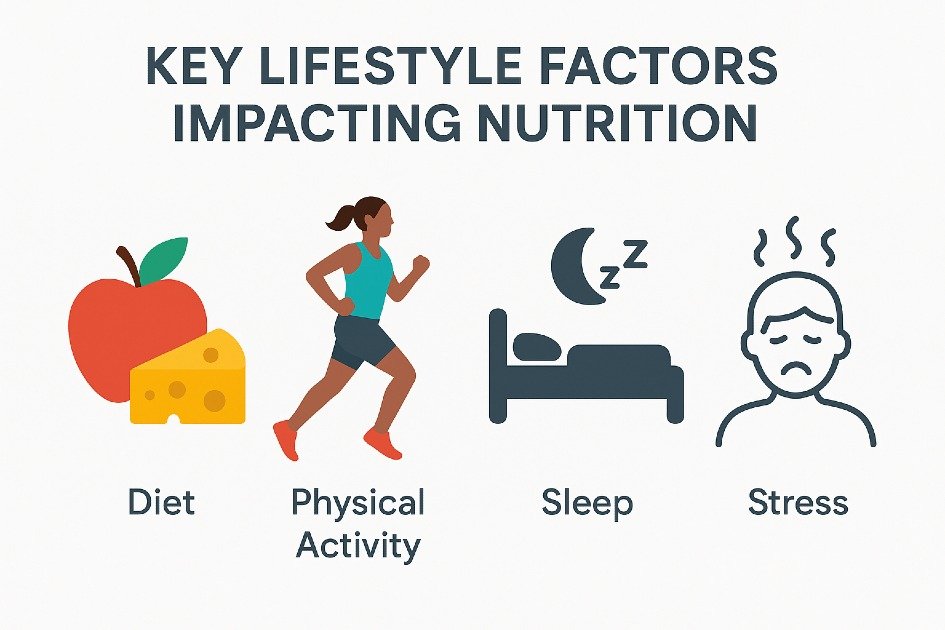
How Daily Habits Shape Your Nutrition
Nutrition is influenced by lifestyle choices and habits, affecting body nutrient absorption, energy usage, and long-term health. Understanding these connections allows for small, realistic changes.
Lifestyle Choices That Shape Your Health
Lifestyle factors, including sleep, stress management, physical activity, hydration, and social routines, interact with diet and can either enhance or undermine health.
Small adjustments, like regular bedtime, walking, or deep breathing, can improve nutrient absorption and energy regulation.
Scheduling meals made eating simple and stress-free, despite feeling tired. Adjusting sleep and sitting habits improved energy levels and improved meal effectiveness.
Daily Habits Boost Nutrient Use and Energy
Maintaining simple routines like eating, hydration, and movement directly impacts nutrient absorption and energy availability.
Implement mindful eating practices, including slow chewing, pairing iron-rich foods with vitamin C, maintaining consistent mealtimes, and hydration before meals for better digestion and nutrient assimilation.
I noticed that eating protein at every meal kept my energy steady and stopped my afternoon tiredness. Slight changes like this helped me stay focused and feel stronger all day.
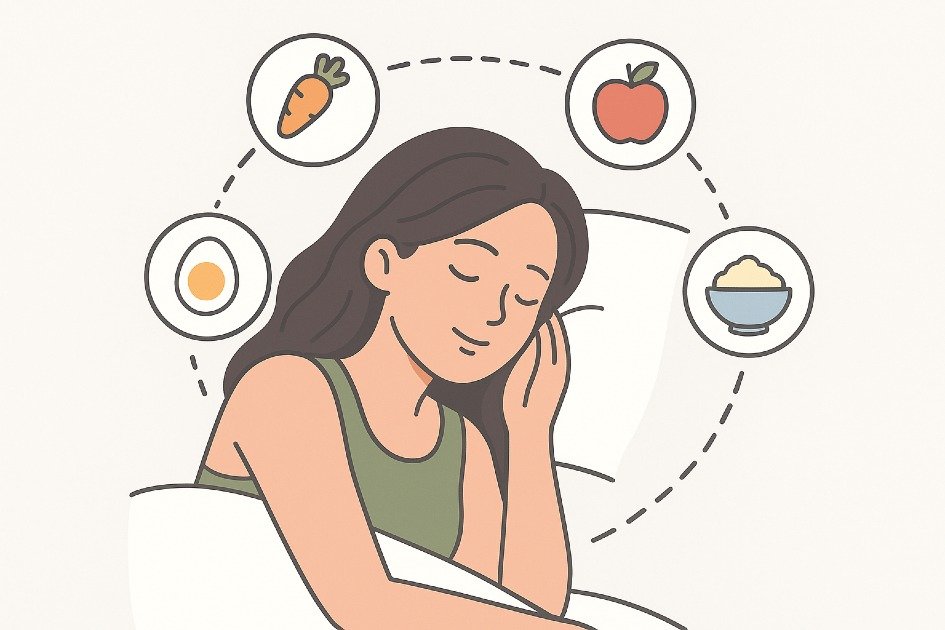
Restful Sleep Boosts Healthy Eating
Sleep is an active process that influences body nutrient digestion and utilization. Poor sleep can negatively impact nutrition, metabolism, and energy levels, while consistent quality sleep enhances the benefits of a healthy diet.
Sleep Loss Drives Unhealthy Food Cravings
Why it matters:
Poor sleep leads to increased hunger and low levels of leptin, causing cravings for high calorie, processed foods, resulting in weight gain, blood sugar instability, and nutrient deficiencies.
How to do it:
- Go to bed and wake up at the same time every day, even on weekends, to keep your body strong and your mind clear.
- Skip late-night snacks with sugar or white carbs, they raise blood sugar and make it harder to sleep well.
- Build a simple bedtime routine by dimming the lights, reading a book, or doing gentle stretches to help your body relax for sleep.
- Cut back on caffeine and alcohol at night because they can stop your body from getting deep, restful sleep.
I use a sleep-tracker to check how well I rest each night. It shows when I sleep deeply or wake up, helping me spot patterns and make slight changes for better sleep.
Sleep Boosts Metabolism and Controls Weight
Why it matters:
Poor sleep disrupts insulin sensitivity, glucose metabolism, and fat storage, making weight management difficult even with balanced diets, leading to energy crashes and fat accumulation.
How to do it:
- Get 7 to 9 hours of good sleep each night and keep a steady bedtime for your best health.
- Create a better sleep space by keeping your room cool, dark, and quiet. Use blackout curtains or a white-noise machine to help you rest deeply.
- Do calming things before bed such as meditating, writing in a journal, or taking deep breaths to keep stress hormones in balance.
- Eat fiber-rich foods, lean proteins, and healthy fats at each meal to keep your blood sugar steady and help you sleep better.
Sync Your Sleep with Smart Eating
Why it matters:
Good sleep habits and mindful nutrition are interconnected, enhancing energy, cognitive function, and immune resilience, thereby supporting each other in a balanced lifestyle.
How to do it:
- Eat your last big meal at least 2 to 3 hours before bed to help your body digest better and keep blood sugar steady through the night.
- If you need a snack at night, pick something healthy like Greek yogurt, almonds, or a banana to help you relax and sleep better.
- Stay moderately hydrated during the day but skip too much water before bed to avoid waking up at night.
- Track your sleep and meals in a small journal to spot patterns and make simple changes that boost your health.
I focused on better sleep and a balanced diet and saw quick results. My cravings dropped, my energy rose, and my weight stayed steady without strict dieting, even with slight changes.
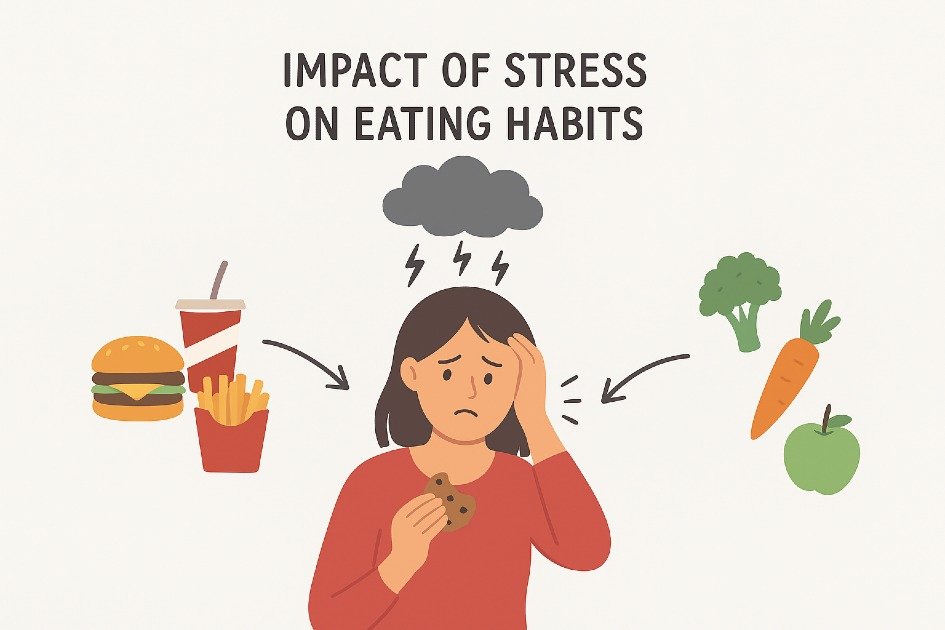
Stress Changes How You Eat
Chronic stress can significantly impact eating patterns, leading to sudden sugar cravings and meal skipping. Understanding and adjusting these patterns can help maintain control over nutrition and well-being.
Why Stress Changes the Way We Eat
Why it matters:
Stress triggers cortisol release, increasing appetite, disrupting digestion, and shifting energy use, often causing fat storage around the abdomen.
How to do it:
- Track what you eat to see how stress affects your meals.
- Notice moments that spark stress, like tight work deadlines or family arguments.
- Drink water instead of snacking without thinking because your body may be thirsty, not hungry.
Master Your Cravings with Emotional Awareness
Why it matters:
Emotional eating, fueled by calorie-dense comfort foods, can lead to nutrient deficiencies and negatively impact mood, energy, and immune system over time.
How to do it:
- Try swapping treats with healthier options like dark chocolate or Greek yogurt.
- Pause for five seconds before each bite and focus on the smell, texture, and taste of your food.
- Pack snacks into small containers instead of eating straight from the bag to avoid overeating.
I use a portion control plate to see exactly how much of each food I should eat. It helps me fill my plate with the right amounts of vegetables, protein, and grains without overeating.
Meal Planning Under Pressure
Why it matters:
Planned meals help maintain healthy blood sugar levels, reduce mood swings, and prevent the need for fast food or processed snacks during high-pressure situations.
How to do it:
- Cook staples ahead by grilling chicken, roasting vegetables, and prepping whole grains for quick, healthy meals.
- Use technology to stay on track by setting reminders to eat at the same times each day.
- Keep healthy snacks like nuts, fruit, or protein bars with you for quick energy and emergencies.
I focus on planning just one day each week and slowly add more days as I get comfortable. This way, I stay organized without feeling overwhelmed, and I build lasting habits that make my week run smoother.
Stress-Reduction Practices That Support Nutrition
Why it matters:
Lower stress enhances hormone balance, digestion, and metabolism, while also reducing impulsive, unhealthy food choices.
How to do it:
- Take five deep breaths before eating to reset your hunger and help you eat mindfully.
- A 15-minute walk lowers stress and stops cravings.
- Journaling or meditating helps you pause and think before eating, giving your mind control over emotions.
Creating a Sustainable Stress-Nutrition Routine
Why it matters:
To manage stress and eating effectively, focus on small, incremental lifestyle changes rather than overwhelming yourself with multiple tasks simultaneously.
How to do it:
- Swap one processed snack for a healthy, nutrient-rich option every week.
- Spend five minutes each day noticing what makes you feel upset or happy.
- Try doing a stress-relieving activity like walking, listening to music, or stretching before each meal.
I manage my stress to eat better, feel healthier, boost my energy, and stay strong.
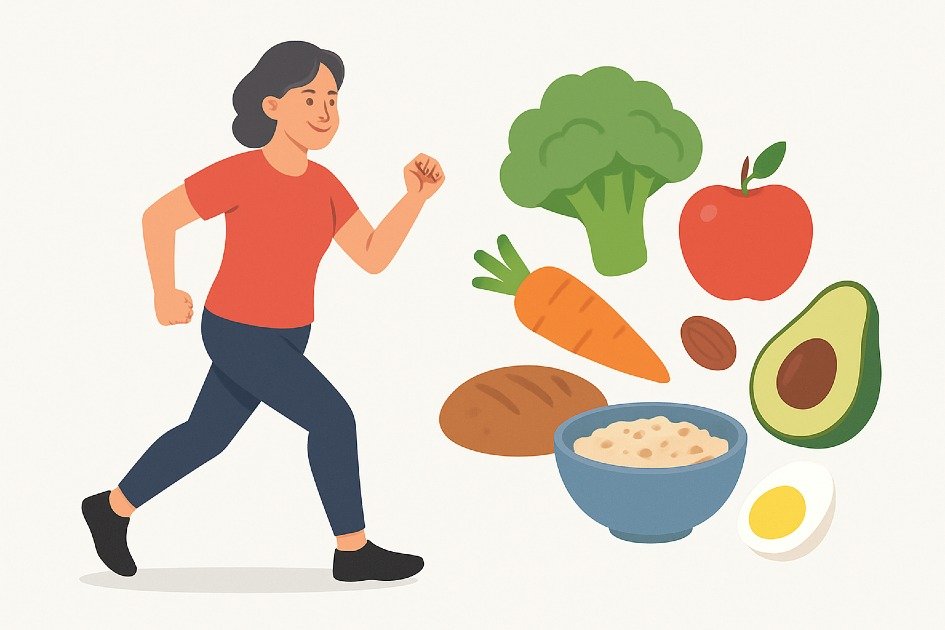
Stay Active and Feed Your Body Right
Regular physical activity directly impacts the body’s nutrient utilization and energy production, necessitating adjustments in nutrition habits to improve health, enhance energy levels, and enhance performance.
Exercise Boosts Your Body’s Nutrient Needs
Why it matters:
Physical activity boosts carbohydrates, protein, and healthy fats for energy, but disregarding these changes can lead to fatigue, slower recovery, and nutrient deficiencies.
How to do it:
- Eat whole grains, fruits, and vegetables before and after workouts to restore your energy and refill your glycogen.
- Eat lean meats, fish, eggs, or plant proteins like lentils after exercise to help your muscles recover and grow stronger.
- Include healthy fats such as avocado, olive oil, or nuts in your meals to boost energy and reduce inflammation.
I keep track of my protein, carbs, and fats with a nutrition app to hit my personal goals.
Fuel Your Body Before and After Workouts
Why it matters:
Eating at the right time is crucial for optimal workout energy use and recovery, as incorrect timing can lead to low energy, muscle soreness, or performance issues.
How to do it:
- Eat a small snack with carbs and a little protein 30 to 60 minutes before your workout. Try Greek yogurt with fruit or whole-grain bread with nut butter.
- Eat a protein- and carb-rich meal within two hours after working out to help your muscles recover. Protein powder work well if you need something quick.
I make sure to drink water before, during, and after my workouts to help my body get nutrients quickly and stay strong.
Strength Training and Increased Protein Needs
Why it matters:
Resistance exercises require protein to rebuild muscle fibers, and low protein intake can stall muscle gains, hinder fat loss, and increase injury risk.
How to do it:
- Eat 1.2 to 2 grams of protein for every kilogram you weigh each day and change the amount depending on how active you are.
- Eat protein at each meal to help your body absorb it and build muscles effectively.
- Try protein powders or bars to reach your daily protein needs when whole foods fall short.
I refuel after workouts by eating protein with carbs to quickly restore my muscles and boost energy.
Cardiovascular Exercise and Electrolyte Balance
Why it matters:
Sweating during cardio can cause electrolyte loss, affecting hydration, muscle function, and energy levels, leading to cramps, fatigue, and dizziness.
How to do it:
- Eat foods high in potassium, magnesium, and sodium like bananas, spinach, and salted nuts.
- Drink electrolyte beverages during long or intense cardio to stay energized and prevent dehydration.
I keep track of my hydration by watching my urine color and know I am well-hydrated when it stays light yellow.
Fuel Your Body with Smart Meal Plans
Why it matters:
Balancing meals with activity is crucial for maintaining energy, nutrient absorption, and optimal body function, as neglecting this balance can hinder progress.
How to do it:
- Plan and cook healthy meals ahead so you always have nutritious options on busy days.
- Keep your portions hand-sized to balance nutrients effectively.
- Fuel your activity with nuts, seeds, fruits, or healthy snack packs for quick energy.
I eat a rainbow of vegetables to get antioxidants that help my muscles recover faster and keep inflammation down.
Boost Health with Simple Daily Habits
Why it matters:
Physical activity alone is insufficient; nutrition and lifestyle factors must be combined for overall health improvement, as ignoring these elements can hinder exercise benefits and slow progress.
How to do it:
- Try changing one meal or snack to match how active you are.
- Monitor your energy, workouts, and recovery daily in a journal or fitness tracker.
I slowly add new healthy foods and drink more water so I can build habits that last.
Busy People Thrive with Smart Tips
Why it matters:
Time constraints can disrupt nutrition, leading to skipped meals or fast-food reliance. Planning supports lifestyle goals and ensures consistent nutrient intake.
How to do it:
- Cook proteins and carbs in bulk on weekends so you can grab meals quickly during the week.
- Carry healthy snacks such as trail mix, nut butter packets, or protein bars for quick energy anytime.
I take short movement breaks and grab water or a light snack to keep my energy up while I work.
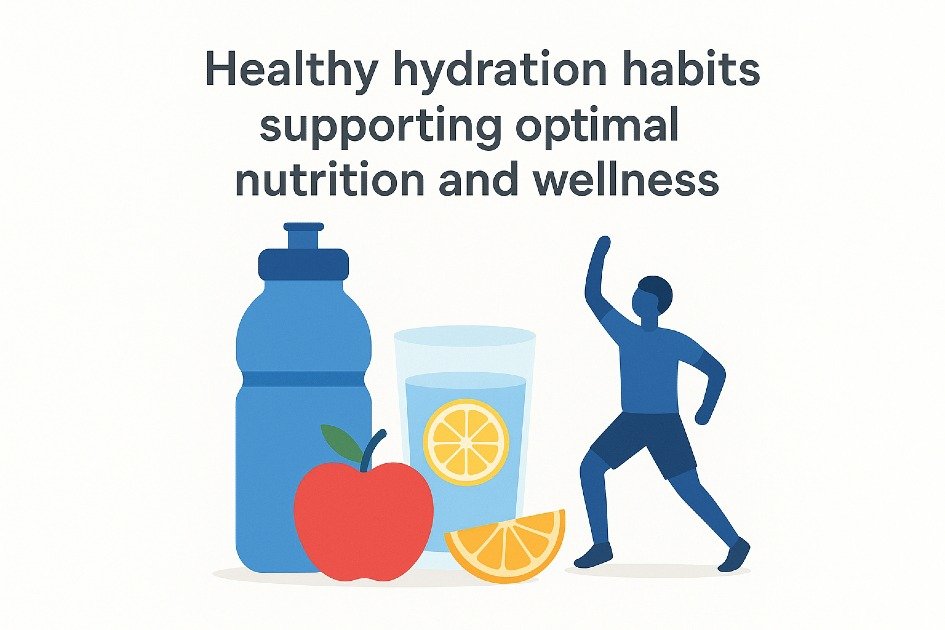
Hydration Habits That Support Nutrition
Proper hydration not only quenches thirst but also aids in nutrient absorption, energy maintenance, and overall health, promoting sharper focus, improved digestion, and consistent energy levels.
Drinking Water Before Meals
Why it matters:
Water consumption before meals aids in regulating appetite, aiding digestion, and supporting metabolism, which is crucial for weight management.
How to do it:
- Drink 1–2 cups of water 20–30 minutes before each meal to support digestion and curb overeating.
- Place a reusable water bottle on your desk or in the kitchen to remind yourself to drink more water.
- Use phone reminders or hydration apps to drink water every day.
I realized that drinking water before lunch helped me eat less without feeling hungry.
Replace Sugary Drinks with Water
Why it matters:
Sugary beverages can increase insulin levels and hinder nutrient absorption, so replacing them with water can improve cardiovascular and metabolic health, reduce empty calories, and enhance hydration.
How to do it:
- Swap one sugary drink each day for a refreshing glass of water.
- Add slices of lemon, cucumber, or berries to your water for natural flavor without extra sugar.
- Keep adding more water each day until it becomes your main drink.
Drinking infused water makes staying hydrated fun and reminds me to keep up my healthy habits every day.
Monitor Your Urine Color
Why it matters:
Urine color indicates hydration, with pale yellow indicating adequate hydration and dark yellow indicating dehydration, which improves digestion, prevents constipation, and supports kidney function.
How to do it:
- Watch your urine color during the day, especially after eating or exercising.
- Drink the right amount of water for your body, depending on how active you are, the weather, and what your body needs.
- Try this quick self-check to make staying hydrated part of your daily routine.
Watching this visual cue helped me spot when I drank less water on busy days and fix it right away.
Hydrate During Physical Activity
Why it matters:
Exercise increases fluid loss, affecting nutrient delivery and energy levels. Proper hydration enhances performance and accelerates recovery, making it a crucial lifestyle factor for effective nutrient utilization.
How to do it:
- Drink water 15 to 30 minutes before your workout to keep your body hydrated and ready for action.
- Drink water often during exercise, especially when your workout lasts more than 30 minutes.
- Electrolyte drink during long or hard workouts help to replace lost minerals.
When I go for long walks or work out, I sip water every 10 minutes to stay strong and full of energy all day.
Eat Water-Rich Foods
Why it matters:
Fruits and vegetables offer hydration, essential vitamins, minerals, and fiber, enhancing digestion, supporting nutrient absorption, and promoting fullness, a crucial lifestyle factor.
How to do it:
- Add water-rich foods such as cucumbers, watermelon, oranges, and leafy greens to each meal for better hydration and health.
- Choose fresh fruits over packaged snacks to stay hydrated and nourished at the same time.
- Mix fruits into smoothies for a quick, hydrating meal that fuels your body.
I started putting watermelon and cucumber in my lunch and quickly doubled how much water I drink every day.
Limit Diuretics That Dehydrate
Why it matters:
Beverages like coffee, black tea, and alcohol can disrupt fluid balance and cause nutrient depletion, requiring careful intake management to prevent dehydration-related fatigue, headaches, and digestive issues.
How to do it:
- Drink an extra glass of water when you have coffee or tea to stay hydrated.
- Drink alcohol in moderation and sip water between drinks to stay balanced and healthy.
- Pay attention to how your body feels; better digestion and higher energy show you are well hydrated.
I stopped drinking coffee late at night and drank water instead and saw my sleep and digestion get much better.
Set Hydration Goals with Tools
Why it matters:
Monitoring hydration is crucial for maintaining a healthy lifestyle, especially during busy times, as it prevents subtle dehydration that can affect nutrient uptake and overall health.
How to do it:
- Track your water intake with a smart bottle or a phone app every day.
- Drink 8 to 10 cups of water each day and adjust your intake for activity or hot weather.
I tracked my water each day and saw it add up, which pushed me to hit my goals without it feeling like work.

Friends Influence What and How You Eat
Social life influences diet choices, influenced by habits, norms, and peer pressure. Understanding these lifestyle factors can help control nutrition without feeling deprived.
Social Scenes Shape What You Eat
Why it matters:
Social life influences diet choices, influenced by habits, norms, and peer pressure. Understanding these lifestyle factors can help control nutrition without feeling deprived.
How to do it:
- Look up the menu before a gathering and pick healthier options.
- Have a small snack first to stop overeating at social events.
- Pay attention to your hunger and wait before going back for more.
I make balanced meals and notice my friends start picking healthier foods too. Eating well inspires them, and we all feel better together.
Balancing Fun and Nutrition in Social Life
Why it matters:
Balancing enjoyment and nutrition without guilt is crucial for a healthy diet, reducing stress and promoting long-term dietary success without skipping social events.
How to do it:
- Switch indulgent foods with nutrient-rich options by having a burger alongside a fresh salad or enjoying a small dessert occasionally.
- Share meals or appetizers so you can taste assorted flavors while keeping portions small.
- Drink smart by picking water, sparkling water, or light beverages instead of sugary drinks and heavy alcohol.
I slow down and chat while I eat, enjoying each bite instead of snacking without thinking.
Build Friends Who Boost Healthy Eating
Why it matters:
Spending time with supportive friends can help maintain and enhance your lifestyle choices, making it easier and more enjoyable to adhere to nutrition goals.
How to do it:
- Tell your friends about your healthy eating plans so they can support and respect your choices.
- Join healthy activities like walking, cooking, or fitness meetups.
I love turning healthy habits into fun challenges by counting steps or prepping meals with friends. It keeps me motivated and makes wellness exciting.
Overcoming Social Pressure to Eat Unhealthily
Why it matters:
Peer pressure can be challenging, but it can lead to unwanted calorie intake and disrupted habits.
How to do it:
- Say no politely by using phrases like “I’m full, thank you!” or “I’ll pass, I’m sticking to my nutrition goals.”
- Pack a healthy dish so you have a nutritious option that matches your lifestyle goals.
- Focus on connecting with others through conversation, games, or activities instead of eating.
I choose ahead of time how much treat I will eat and stick to a healthy limit.
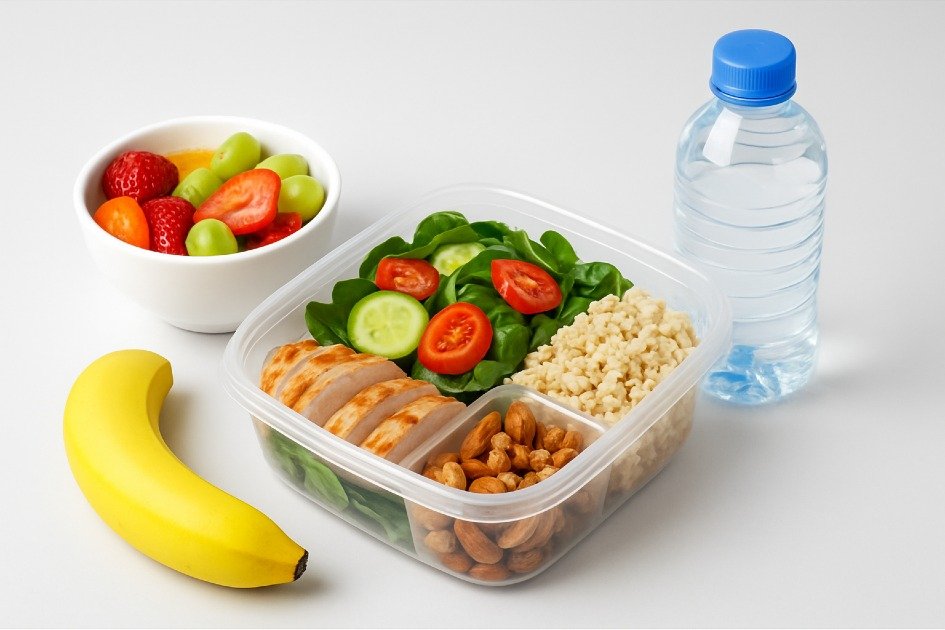
Job Life Shapes How You Eat
Work environment influences eating habits, with sedentary jobs, erratic hours, and high-pressure environments influencing food choices. Understanding this connection can boost energy and long-term health.
Sedentary Jobs and Nutritional Needs
Why it matters:
Poor posture and low movement in the workplace can lead to weight gain and sluggishness, making workplace nutrition crucial for maintaining energy, focus, and overall health.
How to do it:
- Take short movement breaks by standing or stretching every 45 to 60 minutes. A quick 5-minute walk boosts circulation and aids digestion.
- Choose nutrient-rich snacks and swap chips or candy for nuts, fruit, or yogurt to keep your energy steady.
- Try a standing desk or active workstation to burn more calories and stay energized throughout the day.
I make my lunch at home, so I control the ingredients and portions, avoiding processed foods that spike my blood sugar.
High-Stress Workplaces and Emotional Eating
Why it matters:
Chronic stress at work can lead to long-term metabolic and mental health challenges if ignored, triggering craving for high-calorie foods, disrupting digestion, and impairing nutrient absorption.
How to do it:
- Take a few deep breaths before lunch and notice if you are truly hungry or just stressed.
- Take short breaks and walk, stretch, or meditate for 5–10 minutes to lower stress and calm your mind.
- Keep healthy snacks at your desk and choose stress-busting foods like dark chocolate, seeds, or herbal teas instead of sugary treats.
I drink water throughout the day because it helps my digestion and keeps me from craving snacks when I am stressed.
Erratic Schedules and Meal Timing
Why it matters:
Meal irregularity due to shifts, long hours, or meetings can reduce energy, impair focus, and destabilize blood sugar levels, leading to decreased energy and focus.
How to do it:
- Pack portable meals with protein, fiber, and healthy fats to stay full and avoid unhealthy last-minute choices.
- Use phone alarms or apps to remind you to eat meals and snacks on time.
- Cook meals in batches on weekends to save time and avoid stress eating during the week.
- I make time for breakfast every morning to fuel my body and jumpstart my metabolism, even on my busiest days.
Workplace Culture and Food Choices
Why it matters:
Office culture often emphasizes snacks, coffee breaks, and social lunches, leading to overconsumption of sugar or processed foods due to peer influence and accessibility.
How to do it:
- Share healthy snacks or lunch ideas with your colleagues to inspire better eating habits.
- Keep your limits clear and polite by enjoying high calorie treats in moderation or gently saying no.
- Invite colleagues to a healthy potluck and share nutritious dishes. This builds a supportive and wellness-focused workplace.
I bring water or herbal tea to every meeting and sip them instead of reaching for sugary drinks. This keeps me focused, hydrated, and energized without the crash.
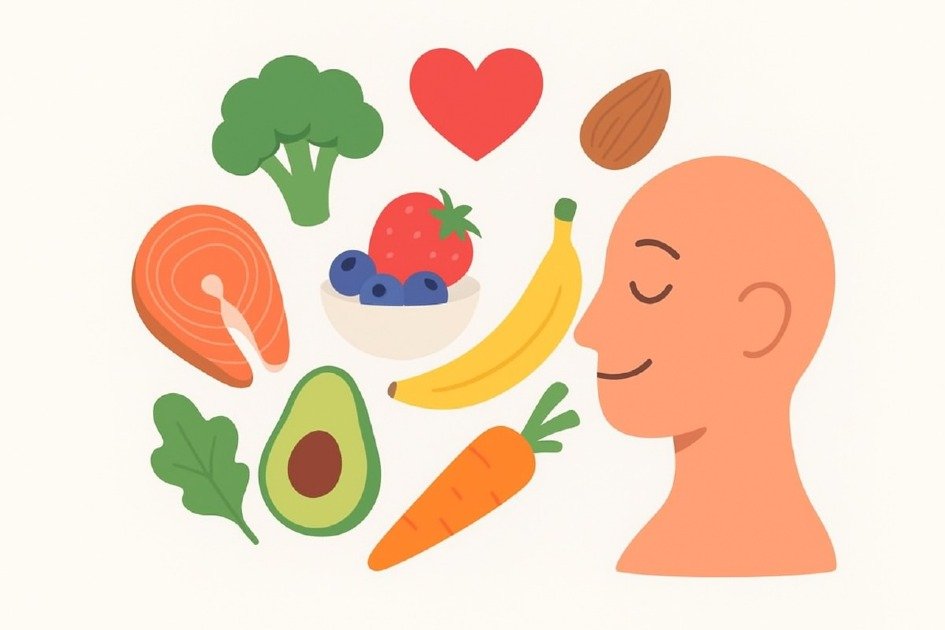
Your Mind Guides What You Eat
Mental health significantly impacts nutrition, influencing food choices and wellbeing. Understanding this connection can lead to practical changes in diet and overall wellbeing.
How Anxiety Influences Eating Patterns
Why it matters:
Anxiety triggers stress hormones, increasing cravings for high-sugar and high-fat foods, and a misguided attempt to regulate mood, leading to poor nutrition and weight fluctuations.
How to do it:
- Check your hunger before snacking and notice if stress is driving you.
- Stock your pantry with nuts, seeds, and fruits to swap out processed snacks.
- Practice quick breathing exercises before eating to lower stress and calm your body.
I manage my anxiety cravings so I can stay in control of my nutrition and protect my long-term health.
Managing Mood Through Smart Food Choices
Why it matters:
Depression can cause irregular meals, loss of appetite, or binge eating, disrupting nutrient intake and energy levels, and directly affecting dietary consistency in daily activities.
How to do it:
- Prepare balanced meals ahead of time to make healthy choices easier.
- Eat omega-3 foods such as salmon or flax seeds to boost brain health.
- Keep a daily food journal to notice how your meals affect your mood.
I start my day with a healthy breakfast to keep my mood steady and my body nourished.
Spot Emotional Eating Triggers Early
Why it matters:
Emotional eating, a coping mechanism, often leads to weight gain, blood sugar spikes, and guilt cycles due to its ability to mask underlying emotions.
How to do it:
- Notice moments that spark stress like heavy work, staying up late, or feeling lonely.
- Try short walks, journaling, or stretching instead of eating without thinking.
- Keep meals at the table without screens so you focus on food, not feelings.
I notice my emotional triggers so I can manage my mood and make smarter food choices.
Eat Mindfully and Take Charge of Your Diet
Why it matters:
Mindful eating promotes awareness of hunger and fullness cues, combating unconscious habits influenced by stress or mood swings, a crucial lifestyle factor.
How to do it:
- Savor each bite and chew your food fully before swallowing.
- Focus fully on your food by putting away phones and turning off the TV to enjoy every flavor and texture.
- Pause after eating and notice how your body and mood respond to the food.
I notice that what I eat helps me avoid impulsive snacks while enjoying food more.
Stress Management Techniques to Support Nutrition
Why it matters:
Chronic stress impacts metabolism and nutrient absorption and ignoring it can negatively impact your lifestyle and overall health.
How to do it:
- Move every day with simple actions like stretching or taking a 15-minute walk.
- Try meditation or deep breathing to calm your mind and reduce stress.
- Try apps or tools that help you track your mood and manage stress.
I notice that when I take small, steady steps to manage stress, I eat more regularly and get the nutrients my body needs.
Building a Mental Health-Friendly Kitchen
Why it matters:
The environment significantly influences behavior, and a kitchen filled with processed foods can negatively impact mental health and diet, thus requiring lifestyle optimization.
How to do it:
- Place fresh fruits, vegetables, and whole grains where you can see and reach them easily.
- Keep tempting snacks out of sight to help curb sudden cravings.
- Try different meal prep methods to make weekdays less stressful and save time.
I keep my kitchen stocked and organized so choosing healthy foods feels natural, not like a fight every day.
Supplements and Nutrition for Mental Clarity
Why it matters:
Nutrients like vitamin D, B-vitamins, and magnesium are crucial for neurotransmitter function and mood, and deficiencies can negatively impact mental health outcomes.
How to do it:
- Boost brain health by taking vitamin D or omega-3 supplements.
- Eat leafy greens, nuts, and whole grains to get essential minerals your body needs.
I fill my nutrient gaps to boost my mind and improve my diet every day.
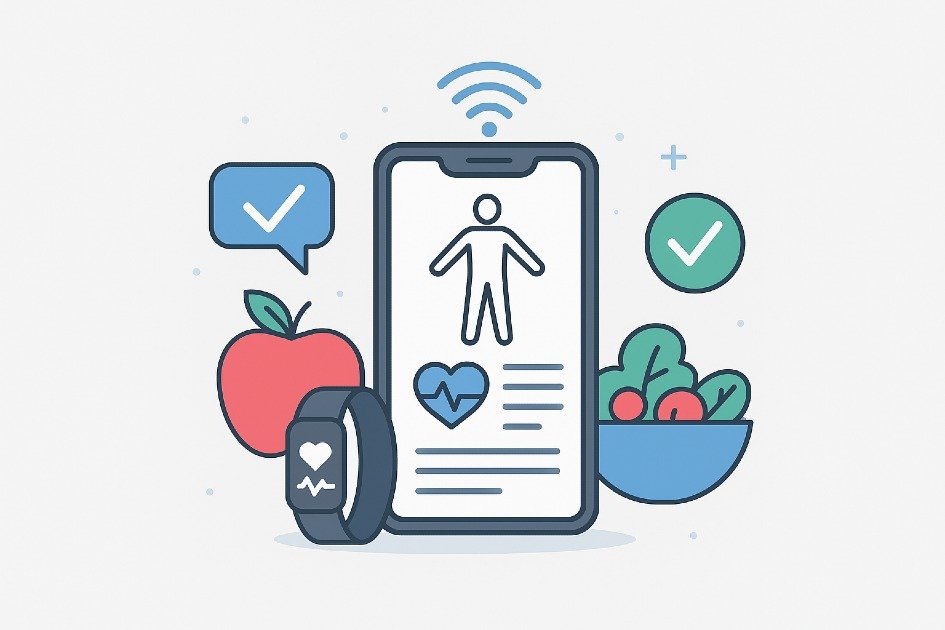
Technology Shapes Your Food Choices
Technology’s role in our digital age can impact on our nutrition, impacting on our eating habits and potentially sabotage our health goals.
The Impact of Screen Time on Eating Habits
Why it matters:
Excessive screen time can unintentionally increase mindless eating, leading to overconsumption and poor food choices, as studies show people often eat more when distracted by screens.
How to do it:
- Have meals without devices and keep screens in another room.
- Savor each bite by noticing the flavors, textures, and how much you eat.
Using Nutrition Apps to Track Your Intake
Why it matters:
Technology-based meal tracking enhances nutritional awareness, promoting informed choices and preventing overconsumption of hidden sugars or unhealthy fats.
How to do it:
- Use a trusted app like MyFitnessPal to track your calories and nutrients every day.
- Keep a daily food log to spot patterns in meals and snacks.
- Track weekly reports to spot missing protein, fiber, or water in your diet.
The Role of Wearables in Nutrition Optimization
Why it matters:
Fitness trackers and smartwatches provide real-time insights into activity, calorie burn, and heart rate variability, impacting appetite regulation and lifestyle factors.
How to do it:
- Match your activity with diet apps to see how exercise affects your hunger and meals.
- Track your steps and water intake daily with your device to reach goals you can achieve.
- Track your sleep and recovery with wearables to improve metabolism and manage your appetite.
Social Media Influence on Food Choices
Why it matters:
Social media influences healthy eating perceptions, inspiring but also creating unrealistic expectations and promoting processed, trendy foods lacking nutrition.
How to do it:
- Follow certified nutritionists and wellness experts to see trusted advice in your feed.
- Focus on your own nutrition goals and ignore viral diet trends.
- Try one new healthy recipe each week using positive content as your guide instead of copying everything you see.
I use technology to eat healthier and stay accountable by tracking my meals, limiting screen time, and choosing positive social media.
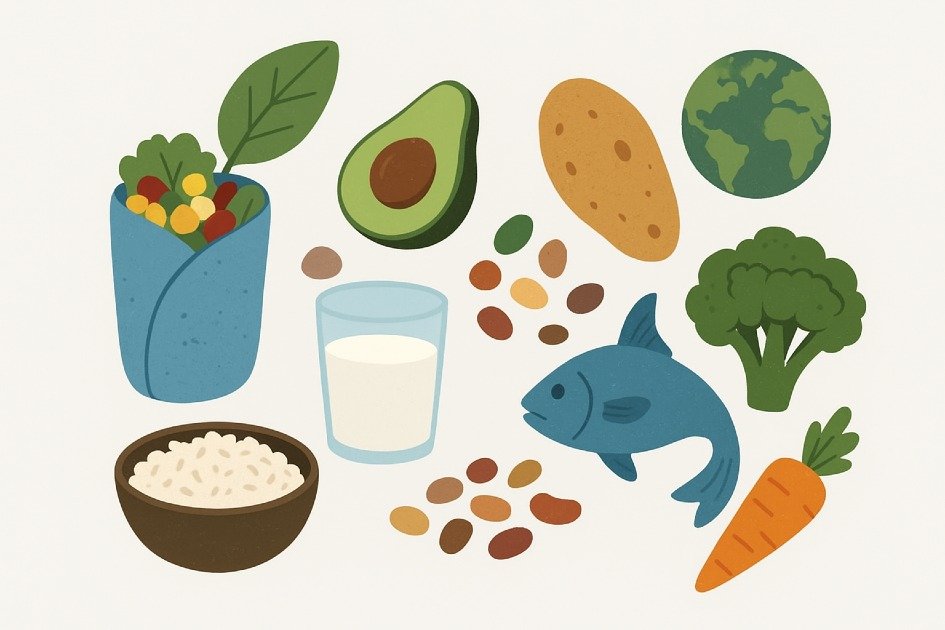
Culture Shapes What We Eat Every Day
Our cultural background and surroundings significantly influence our food choices, influencing our nutrition. Understanding these lifestyle factors can help make conscious, health-supporting decisions.
Culture Guides to What We Eat and How We Eat
Why it matters:
Culture influences diet, meal preparation, and portion sizes. Traditional diets can promote longevity or contribute to health issues. Recognizing cultural patterns helps optimize diet without losing cultural identity.
How to do it:
- Look at your family and cultural meals and spot foods that give strong nutrients versus ones high in sugar, salt, or unhealthy fats.
- Try healthier options like swapping white rice for brown rice or quinoa to boost your fiber.
- Keep tradition alive by adding more vegetables, lean proteins, or plant-based swaps to your favorite recipes.
- Share healthy changes with your family by making small, gradual adjustments that feel natural and easy to keep.
I make my meals healthier by adding colorful vegetables. They help me get the right mix of proteins, carbs, fats, and important vitamins naturally.
Your Environment Guides Your Food Choices
Why it matters:
Environmental factors, such as urban and rural settings, can significantly impact food choices, either supporting or hindering nutritional goals.
How to do it:
- Explore local options by going to farmers’ markets, community gardens, or co-ops to get fresh seasonal produce.
- Focus your weekly meals on fresh, affordable foods instead of depending on packaged items.
- Fill your kitchen with fruits, vegetables, nuts, and healthy supplements so you choose nutritious foods more easily.
I learned to plan my meals around the produce I could find, which made my diet healthier and stopped me from grabbing fast food on impulse.
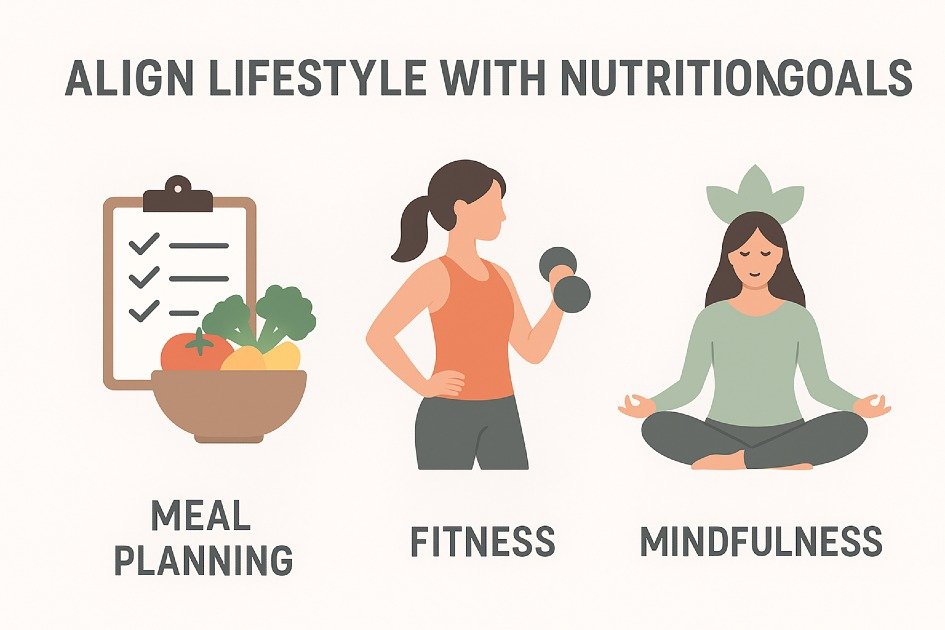
How to Align Lifestyle with Nutrition Goals
Nutritional success involves a balanced lifestyle, including the right foods and lifestyle factors, which can be achieved through practical strategies and understanding.
Prioritize Consistent Sleep Patterns
Why it matters:
Sleep significantly impacts appetite-regulating hormones like ghrelin and leptin, and irregular sleep leads to increased cravings for high-calorie foods.
How to do it:
- Go to bed and wake up at the same time every day, even on weekends, to keep your body clock steady.
- Dim the lights, put away screens, and relax with deep breathing before sleep.
- Avoid caffeine and large meals at night to keep your sleep steady and restful.
Manage Stress with Mindful Practices
Why it matters:
Chronic stress triggers cortisol release, leading to overeating, especially sugary or processed foods, and impair digestion, nutrient absorption, and gut health, exacerbated by poor dietary choices.
How to do it:
- Spend 10–15 minutes each day practicing mindfulness, meditating, or writing in a journal.
- Try walking or doing yoga to ease stress and relax your body.
- Track your stress with an app to spot triggers and find ways to manage them better.
Increase Physical Activity Strategically
Why it matters:
Regular exercise improves nutrient absorption and metabolic efficiency, while sedentary habits slow digestion and affect energy balance.
How to do it:
- Do strength training two to three times a week to speed up your metabolism.
- Take quick movement breaks during your day by standing or walking while working.
- Fuel your body after exercise with protein, carbs, and healthy fats to boost recovery and results.
Hydrate with Purpose
Why it matters:
Water is crucial for digestion, nutrient transport, and cellular function, and dehydration can lead to overeating. Proper hydration aids detoxification and maintains energy levels.
How to do it:
- Have a glass of water before every meal to help your digestion work better.
- Keep a reusable water bottle with you and set alerts to drink regularly.
- Try adding fruits or herbs to water to make a tasty, low-calorie drink.
Cultivate a Mindful Eating Routine
Why it matters:
Mindless eating can lead to overconsumption, poor digestion, and weakened satiety cues. Adapting to lifestyle factors like eating environment and pace helps connect with hunger and fullness signals.
How to do it:
- Sit at the table when you eat and stay off your phone or TV to enjoy your meal fully.
- Chew your food slowly and enjoy each bite to boost digestion and feel full longer.
- Plan your meals early so you do not reach for junk food later.
Build a Supportive Social Environment
Why it matters:
Social interactions, such as friends, family, and colleagues, can unconsciously influence your eating habits. A supportive environment promotes healthy lifestyle habits and maintains accountability.
How to do it:
- Tell your friends or family about your nutrition goals and ask them to join your journey.
- Go to social events with a simple plan—bring a healthy dish or eat a light snack before you arrive.
I joined local and online groups about healthy eating to stay motivated and learn new tips every day.
Optimize Your Work Environment
Why it matters:
Long desk hours can lead to irregular meals, mindless snacking, and nutrient deficiencies. Adjusting workspaces is a practical lifestyle factor to support healthy eating habits.
How to do it:
- Keep healthy snacks like nuts, fruit, or yogurt at your desk to stay energized and focused.
- Use your phone to remind you when it is time to eat or drink water.
I prepare my meals early and pack them in easy-to-carry containers so I can eat healthily wherever I go.
Recap: Nourish Your Life for Lasting Health
Aligning lifestyle factors with nutritional goals can lead to increased energy, focus, and a body that responds to choices.
Harvard Health suggests a gradual, sustainable lifestyle transformation, starting with small, manageable steps like increasing fruits and vegetables and regular physical activity, focusing on consistency and enjoyable habits.
Each lifestyle factor, such as sleep, stress management, movement, and social interactions, has a significant impact on overall health.
By consciously optimizing these factors, you can make conscious choices that accumulate into lasting well-being.
Embrace each lifestyle factor with intention, create a positive feedback loop, and make nutrition a natural part of your daily life.
Frequently Asked Questions
How do lifestyle factors affect long-term health and nutrition?
Lifestyle factors like sleep quality, stress, physical activity, and social environment significantly impact nutritional status. Optimizing these can enhance nutrient absorption, maintain metabolic harmony, and prevent chronic illnesses.
Can stress really change what I crave to eat?
Elevated stress can lead to sugar-addicted food preferences, requiring countermeasures like mindful eating, meditation, and adaptogenic herbs like adaptogen supplement to regulate stress and improve nutrition.
How much exercise do I need to optimize my nutrition?
Exercise boosts calorie burns and nutrient utilization, improving carbohydrate metabolism and protein synthesis. For beginners, 150 minutes of aerobic activity and two resistance sessions is recommended, with fitness tracker tools for optimal nutritional impact.
What are simple ways to improve sleep for better nutritional health?
Maintaining a consistent sleep schedule, avoiding caffeine, reducing blue light exposure, and supplementing with natural sleep aids can enhance rest quality and support healthier eating patterns.
How can I make eating healthy despite a busy schedule?
Time constraints often hinder good nutrition, but meal prepping, portion control, and strategic snacking can help. Nutrient-dense options like meal prep containers or subscription services can save time.
Does socializing always lead to poor food choices?
Social environments influence eating behaviors, but awareness and preparation can prevent dietary derailment. Balanced meals, moderation, and health-conscious venues can maintain nutritional integrity in social settings.
Are there specific habits that improve both mental health and nutrition?
Regular exercise, sleep, mindfulness, journaling, and nature walks promote mood regulation, nutritional absorption, cognitive wellness, and appetite stabilization, with tools like Mindful.org integrating seamlessly into daily routines.
How can technology be used without negatively impacting my diet?
Excessive screen time can lead to unhealthy habits, but technology can also be used for good, tracking meals, hydration, and providing workouts for healthier living.
Can environmental factors really change my nutritional needs?
Environmental exposures, such as temperature, altitude, pollution, and fresh food access, influence nutrient requirements. Tailoring diets and supplements to meet unique environmental challenges is crucial.
What small lifestyle changes have made the biggest impact on my diet?
Regular lifestyle adjustments, such as 7-9 hours of sleep, daily movement, nutrient-rich food, mindful eating, and consistent exercise, can significantly improve digestion, nutrient absorption, and metabolic health.

